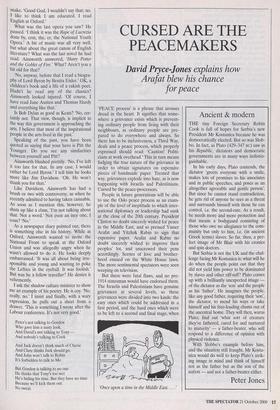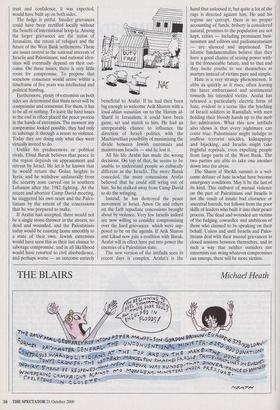CURSED ARE THE PEACEMAKERS
David Pryce-Jones explains how Arafat blew his chance for peace
`PEACE process' is a phrase that arouses dread in the heart. It signifies that some- where a grievance exists which is prevent- ing ordinary people from living with their neighbours, as ordinary people are pre- pared to do everywhere and always. So there has to be inclusiveness, a Third Way, deals and a peace process, which properly expressed should read: 'Caution! Politi- cians at work overhead.' This in turn means fudging the true nature of the grievance in order to obtain signatures on expensive pieces of handmade paper. Treated that way, grievances explode into hate, as is now happening with Israelis and Palestinians. Cursed be the peace-processors.
People in future generations will be able to use the Oslo peace process as an exam- ple of the level of ineptitude to which inter- national diplomacy or leadership had sunk at the close of the 20th century. President Clinton no doubt sincerely wished for peace in the Middle East, and so pressed Yasser Arafat and Yitzhak Rabin to sign that expensive paper. Arafat and Rabin no doubt sincerely wished to improve their peoples' lot, and unscrewed their pens accordingly. Scenes of love and brother- hood ensued on the White House lawn. The more sentimental spectators were seen weeping on television.
But there were fatal flaws, and no pre- 1914 statesman would have endorsed them. The Israelis and Palestinians have genuine grievances at several levels, so these grievances were divided into two kinds: the easy ones which could be addressed in a first period, and the hard ones which were to be left to a second and final stage, when `Once upon a time in the Middle East....' trust and confidence, it was expected, would have built up on both sides.
The fudge is pitiful. Smaller grievances could have been rectified locally without the benefit of international hoop-la. Among the larger grievances are the status of Jerusalem, the return of refugees and the future of the West Bank settlements. These are issues central to the national interests of Israelis and Palestinians, and national iden- tities will eventually depend on their out- come. On these issues, there is very little room for compromise. To propose that somehow consensus would arrive within a timeframe of five years was intellectual and political humbug.
Furthermore, plenty of extremists on both sides are determined that there never will be compromise and consensus. For them, it has to be all or nothing. To leave the hard issues to the end in effect placed the peace process in the hands of extremists. The moment any compromise looked possible, they had only to sabotage it through a resort to violence. Today they are doing only what they were virtually invited to do.
Unlike his predecessors or political rivals, Ehud Barak believes that peace in the region depends on appeasement and retreat by Israel. He let it be known that he would return the Golan heights to Syria, and he withdrew unilaterally from the security zone carved out in southern Lebanon after the 1982 fighting. At the recent and abortive Camp David meeting, he staggered his own team and the Pales- tinians by the extent of the concessions that he was prepared to make.
If Arafat had accepted, there would not be a single stone-thrower in the streets, no dead and wounded, and the Palestinians today would be coasting home smoothly to a state of their own. Jewish extremists would have seen this as their last chance to sabotage compromise, and in all likelihood would have resorted to civil disobedience, and perhaps worse — an outcome entirely beneficial to Arafat. If he had then been big enough to welcome Arik Sharon with a loud ahlan wasahlan on to the Haram al- Sharif in Jerusalem, it could have been game, set and match to him. He had an unrepeatable chance to influence the direction of Israeli politics, with the Machiavellian possibility of maximising the divide between Jewish extremists and mainstream Israelis — and he lost it.
All his life Arafat has made the wrong decisions, On top of that, he seems to be unable to understand people so culturally different as the Israelis. The more Barak conceded, the more concessions Arafat believed that he could still wring out of him. So he stalked away from Camp David to do the wringing.
Instead, he has destroyed the peace movement in Israel. Amos Oz and others on the Left repudiate concessions brought about by violence. Very few Israelis indeed are now willing to consider compromising over the hard grievances which were sup- posed to be on the agenda. If Arik Sharon and Likud now join a coalition with Barak, Arafat will in effect have put into power the enemies of a Palestinian state.
The new version of the intifada seen in recent days is complex. Arafat's is the hand that unloosed it, but quite a lot of the rage is directed against him. He and his regime are corrupt, there is no proper accounting of funds, bribery is considered natural, promises to the population are not kept, critics — including prominent busi- nessmen and editors and parliamentarians — are silenced and imprisoned. The Islamic fundamentalists believe that they have a good chance of seizing power with- in the foreseeable future, and to that end they incite youths to see themselves as martyrs instead of victims pure and simple.
Hate is a very strange phenomenon. It ebbs as quickly as it rises, often leaving the hater embarrassed and sentimental towards his intended victim. Arafat has released a particularly electric form of hate, evident in a scene like the lynching of Israeli soldiers in Ramallah, with men holding their bloody hands up to the mob for admiration. What this new intifada also shows is that every nightmare can come true: Palestinians might indulge in endless terrorist suicides, kidnappings and hijacking, and Israelis might take frightful reprisals, even expelling people from large parts of the West Bank. The two parties are able to take one another down into the abyss.
The Sharm el Sheikh summit is a wel- come defuser of hate in what have become emergency conditions. May it be the last of its kind. This outburst of mutual violence on the part of Palestinians and Israelis is not the result of innate bad character or ancestral hatreds, but follows from the poor skills of leaders who built it into their peace process. The dead and wounded are victims of the fudging, cowardice and ambitions of those who claimed to be speaking on their behalf. Unless and until Israelis and Pales- tinians deal with their mutual grievances in closed sessions between themselves, and in such a way that neither outsiders nor extremists can swing whatever compromises can emerge, there will be more victims.


























































































 Previous page
Previous page